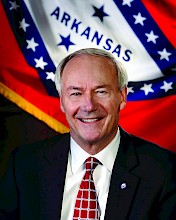Opioid epidemic: a national health emergency
 By The Hon. Asa Hutchinson
By The Hon. Asa Hutchinson
Governor of Arkansas
In the nearly 20 years since I became director of the Drug Enforcement Administration, the illegal use of prescription drugs has become an epidemic that our nation couldn’t have imagined. Drug addiction is an insidious enemy of our families and our nation. Addiction to opioids is the biggest challenge we face. An addiction often begins as a legitimate use of a prescription to block pain after an injury or surgery. Addiction slips up on people who would never have considered abusing medicine.
On Thursday, Oct. 26, President Trump declared the opioid epidemic a national health emergency in the United States, where about 175 people a day overdose on an opioid. Nationally, the number of overdose deaths by prescription opioids has quadrupled since 1999.
In Arkansas, we already are addressing the threat. This year, our legislators passed a law that allows pharmacists to dispense naloxone without a prescription. Naloxone is an antidote for an opioid overdose. Some of our first responders have saved lives because they were carrying the drug.
We have established a statewide protocol for tracking the prescribing and dispensing of opioids. Law enforcement agencies can watch for trends and anticipate problems.
We’ve also established drug courts, which allow judges the flexibility to offer drug offenders court-supervised treatment and other assistance instead of sentencing them to prison.
But let me bring this to a personal level. It’s the real-life stories that drive home the heartache. Linda Lary spent much of her childhood in North Little Rock, and her mother was a native of Waldo. Linda now lives in Greenwood, Mississippi. Her son Michael was an All-State football lineman in high school and an Eagle Scout by age 15. He was a member of the Phi Delta Theta fraternity at Ole Miss. He was one hour short of graduation with a degree in exercise physiology. Michael’s slide into addiction began seven years ago with 60 Percocet pills a doctor prescribed after he developed meningitis. He was in and out of rehab.
Shortly before he died, he admitted to his parents that he was addicted to heroin. He died sometime after 5 p.m. on Dec. 19, two days before his 28th birthday. His Bible and a dose of Narcan [the antidote naloxone] were on the floor beside him.
Linda is moving from grief to action. As she has spoken out, parents have been calling her for comfort and with the names of drug dealers, which she passes to local law enforcement agents. She is a forceful advocate for the things she believes addicts need: Year-long rehab centers and sober-living houses; strict monitoring of drug testing with an observer; and intensive outpatient therapy.
To win this fight against drug abuse, we must pay attention to how and where we prescribe opioids.


